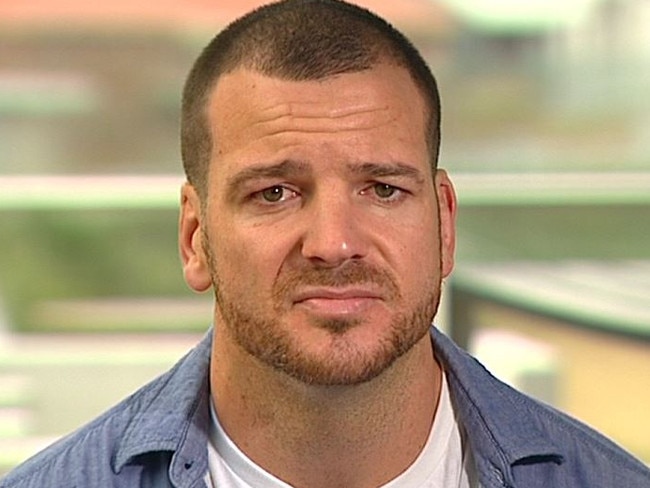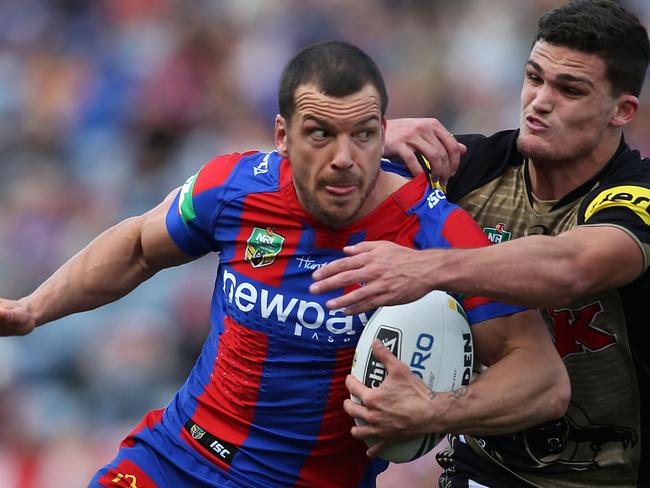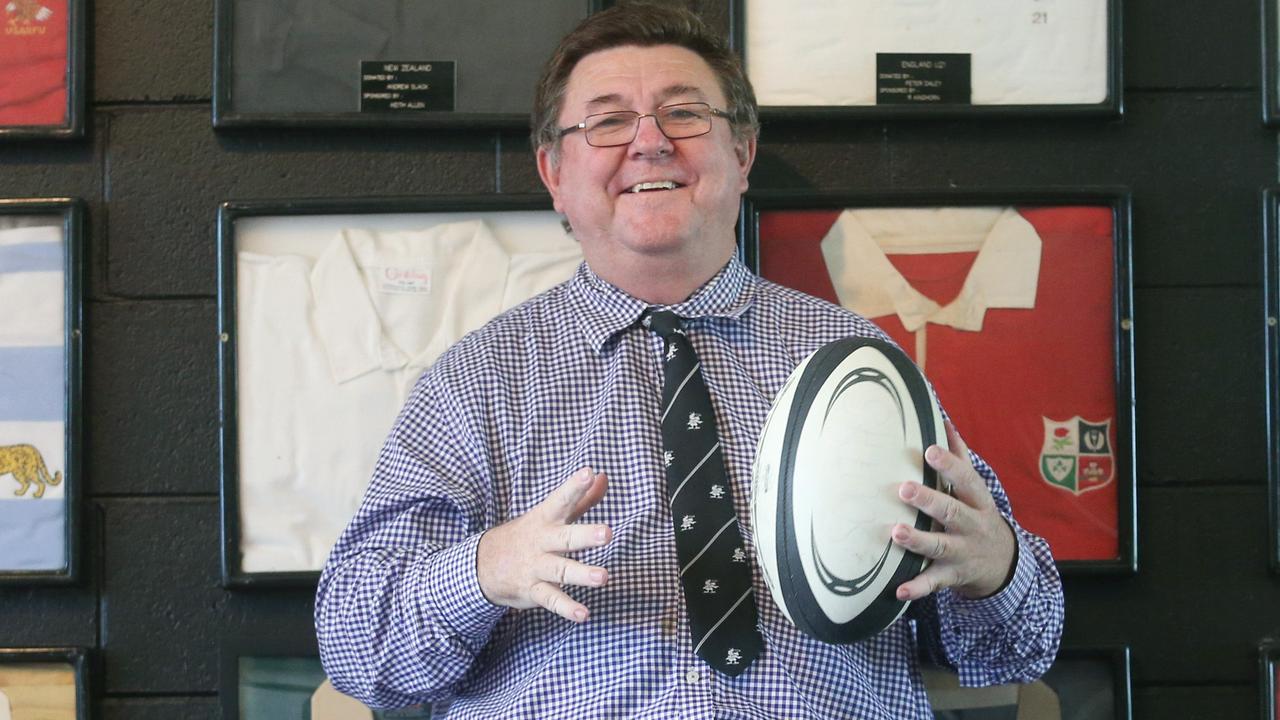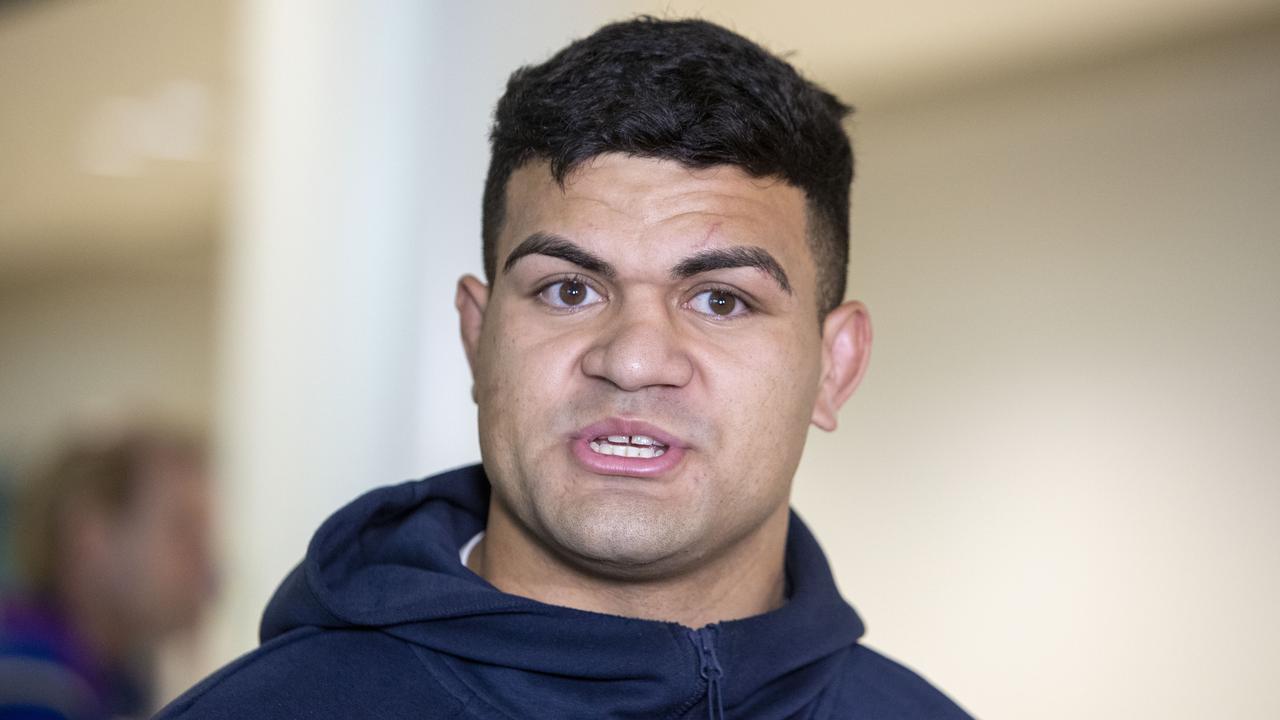NRL needs to do more to help the mental health of footy players
Jarrod Mullen, like most footballers, was taught never to show he was hurt. So, when he was banned from the game, he struggled silently for some time. Jessica Halloran says footy players need help looking after their mental health, yet most are not getting it.
- How one woman will crash-tackle NRL’s blokey culture
- Players to feel financial burden of ongoing scandals
Jarrod Mullen, like most footballers, was taught never to show he was hurt.
He was instructed to never show fear or fragility. The unspoken edict was to never, ever show pain.
“Keep on going is drummed into you,” someone close to Mullen tells me.
It was also “drummed” into Mullen to always show how “tough” he was. There was no time or place for vulnerability.
So, when Mullen was banned from the game for testing positive to anabolic steroids, he struggled silently for some time. He put on a brave face to family and friends. Told those close to him he was fine and didn’t want to talk about it.

In an interview six months into his four-year ban, his mother Leeann spoke of her worries about how her son was handling it.
“He’s tried to be really brave for all of us,” Leeann told the ABC.
“But I think that’s taken its toll after six months of him pretending there’s nothing wrong.”
MORE FROM JESSICA HALLORAN:
HALLORAN: WHY WARNER REJECTED BIG MONEY TO ’SNITCH’
WHY AFL TRUMPS NRL WHEN IT COMES TO JUNIOR SPORT
Two years on and the hurt and the hell of what Mullen has gone through emerged last week when it was revealed a drug overdose almost cost him his life.
Mullen, who was once on a high six-figure salary for his incredible footy talents, has struggled with life out of the game but he was also struggling when he was in it.
In 2017, injured and in absolute “desperation” to play again, he had just suffered a second serious hamstring injury in a year.
Mullen turned to a “health professional” who he says, unknown to him, injected him with the steroid. It didn’t help his injury. That mistake cost him his dream.
But how much pressure was Mullen feeling that he felt so desperate to do that? What more could have been done to prevent all this happening?
Mullen’s case raises the question, again: is enough being done for NRL footballers and their mental health to handle the pressures tossed up by the game? The short answer is: no.
The dollars spent on mental health by clubs is a slither compared to the huge amount of money being spent on physically conditioning these footballers.

The Roosters are the only NRL team with a clinical psychologist on their footy department staff.
Yes, there are a host of mental health services offered by clubs, the NRL, and RLPA. Services include access to off-site psychologists, “wellbeing” and “welfare officers” — but nothing beats having a clinical psychologist permanently and physically on staff.
The NRL recently mandated clubs to employ a “nutritionist”, so why not a staff member that could possibly save someone’s life?
The Australian Psychological Society urged the NRL to invest more in the mental health of its players.
“The NRL is not just a leader in sport but a role model in the community,” the society’s CEO Frances Mirabelli said.
“Getting players the support they need both on and off the field sends a strong message to the Australian community that it’s OK to seek help for mental health concerns.”
Two-time premiership-winning coach Trent Robinson understands the importance of clinical psychologists.
“We have employed a clinical psychologist since 2013 because we don’t have the tools to support the players in the safety net areas, the stuff where they fall through, the hidden diseases we don’t see, it’s been vital to us,” Robinson said.
“We are mandated to have a lot of things and I think that a clinical psychologist should be one.
“We are snapshot of society, footballers go through normal issues and it should become more mainstream that people should seek out advice when needed. People would be shocked at the difference of what we have on offer in the club compared to a long time ago. Back then, it was bury it somewhere and deal with it another time.
“A footballer may need a conversation weekly or for a year, years, or just one session, with someone who is arms-length away from their coach.’’

Leading Australian psychologist Ruth Anderson, who has been the head psychologist for the Australian Olympic team and later the decorated British Olympic cycling team, says some sports in this country need to be more proactive.
“Many sports are waiting until it is too late to make significant change or an intervention with an athlete,” Anderson said.
“We don’t want to wait for athletes to develop a mental health problem; we want them to have already worked on developing their psychological ability.”
AFL boss Gillon McLachlan this month said mental health, rather than drugs or gambling, is the biggest issue in the AFL and the league will appoint a mental health manager to deal with it.
Fifteen of the 18 AFL clubs have either a psychologist or psychiatrist on staff.
Swans coach John Longmire last year argued that mental health should be counted outside the cap. In the AFL, there’s a soft cap which restricts the amount of money that goes towards supportive measures.
Back in the NRL, Robinson said there should be no cap on mental health spending.
“It should definitely be outside the football cap, the football cap stops the arms race in a certain race in a club where the NRL felt like we were getting excessive,” he said.
Today, Mullen’s family is desperately trying to care for an extremely fragile man, shattered by a bad decision made in desperation and trying to repair his life.
While he serves his doping ban, he can’t have contact with the club or the game. Mullen was never allowed to clean out his locker at the Knights.
Hasn’t been allowed to set foot back into the Knights which had been his home for 15 years.
He has been and is suffering.


